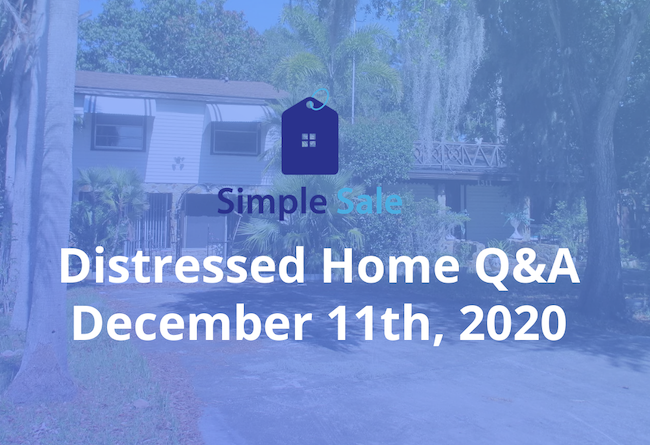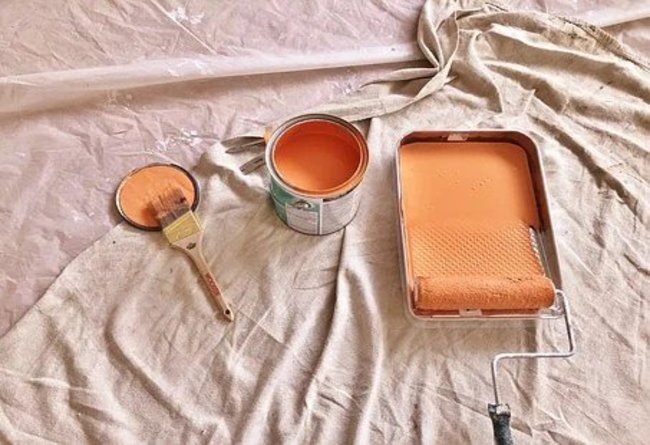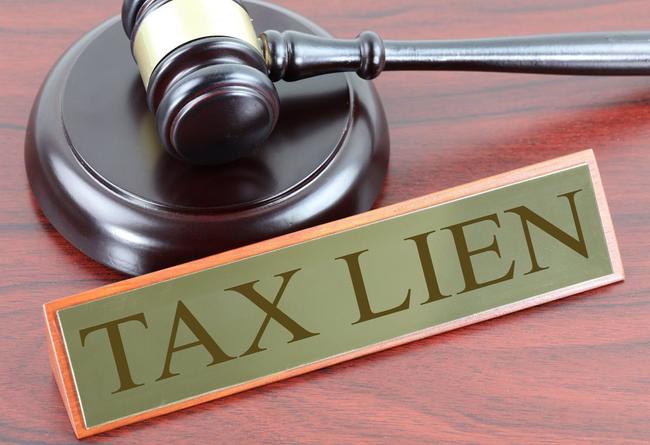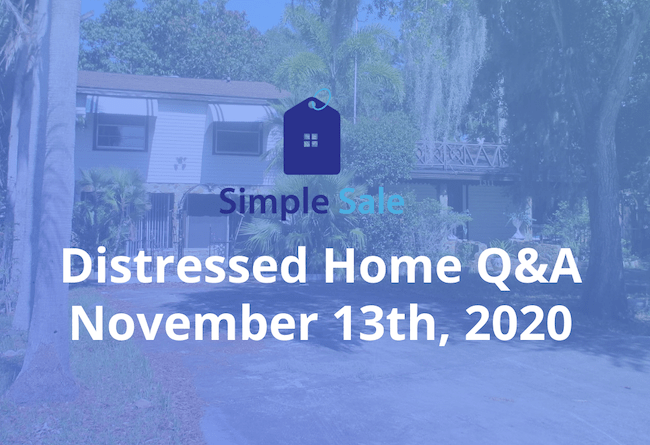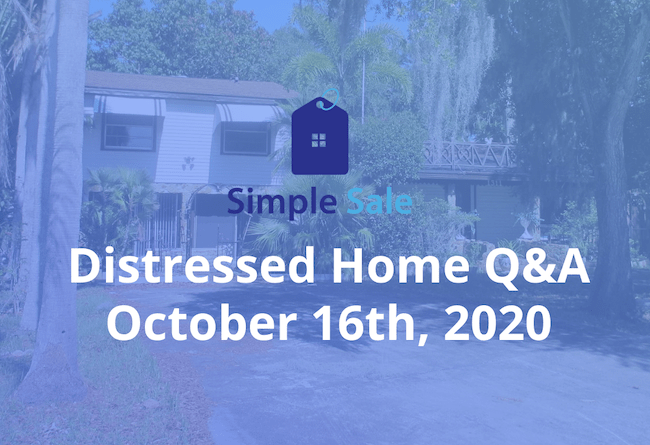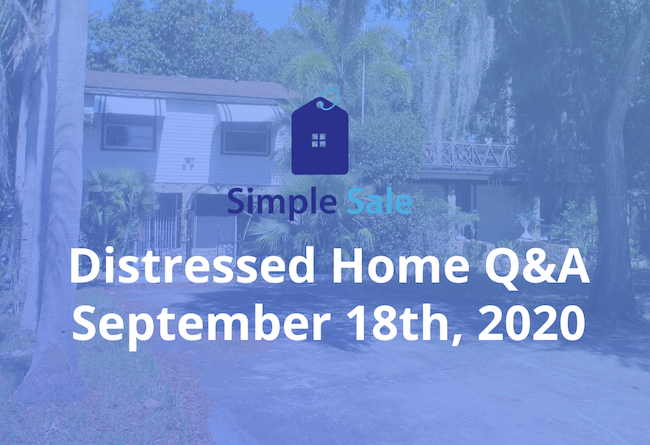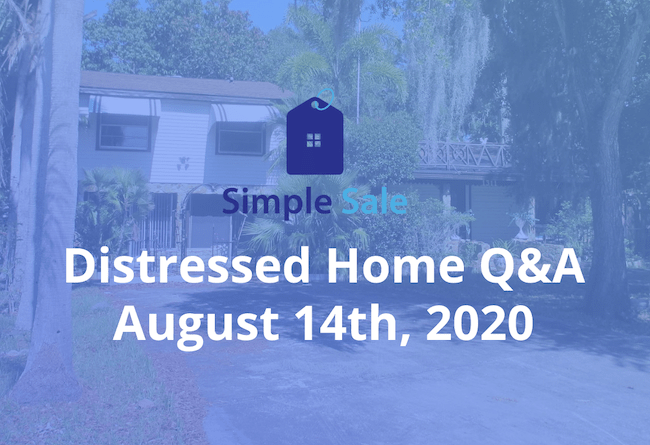For your ease, we have provided a transcript of the Distressed Home Q&A Recording.
Hey, this is Evan with Simple Sale Central Florida. We’re here for our monthly Q&A. It’s December, heading into the end of the year and we just wanted to make an introduction.
Simple Sale Central Florida’s mission is to bring transparency and accountability to distressed home sales. We buy properties throughout Central Florida – currently that’s Orlando, Tampa, Titusville, Orange County, Hillsborough, Pinellas County, Brevard, Seminole, Osceola and everything in between.
Simple Sale specializes in buying properties that have issues such as excessive repairs, probates, liens, judgments, foreclosures. Anything that isn’t typical in a transaction in buying or selling a house. We specialize in taking care of that. We also list properties for people that have a distressed property and that are in a rush to sell. We can list your property and work to take care of issues and help you manage your distressed home sale.
With that being said, we’ll get into the first question. I think we have 10 or so questions here that we’ll go through.
1. What is a distressed property?
As I was just saying, we typically define distressed as a property that has excessive repairs, or legal issues like probate, liens, judgments, foreclosures, anything of that nature, or disputes. Anything that brings complexity to a home sale is what we consider a distressed property.
It doesn’t necessarily have to be in bad condition, it may just be a property that has a complexity to be able to sell it. Maybe there’s a lien on it, maybe there’s ownership by a person that’s deceased. Or maybe there’s ownership by a person that doesn’t want to sell but you and other people need to sell your ownership of the property.
Whatever the case may be, we define all of those things as distressed because it makes the situation complex and it makes the situation confusing for the average home seller. That’s how we like to think about distressed property.
2. How can I get rid of my distressed home?
Really, there are a couple of options. (A) You can go out and find someone to try to buy it. As I was talking about, distressed may mean that there’s legal issues on the property. If there’s legal issues on the property a lot of buyers will not take on the property. You may have to get an attorney involved to take care of the legal issues. So one way is to go out and find buyers.
Option (B) is to work with an agent that specializes in distressed property cases. The benefit of working with a distressed property buyer specifically is because they’ll specialize in cases of distressed property. They’ll be used to working with attorneys on legal issues, working with HOAs on HOA foreclosure issues, HOA lien issues, working with the stop holds, things of that nature.
If you’re trying to sell your distressed property, you really want to be specific about who you find, that they specialize in those types of things. We often see buyers that don’t know how to handle those situations. You’ll go through 5 buyers and none of them are able to close on the property because they’re not used to dealing with those types of situations and do not want to figure out how to deal with those situations. We see that a lot.
Make sure that whoever you work with, whether it be Simple Sale or another company, that they do in fact specialize in dealing with distressed properties.
3. How does a lien work?
A lien is essentially put on a property, and whenever it is sold or changes hands, the title company and the underwriters for the title insurance will see on the title commitment that there is a lien on the property and that company or that person is wanting to get paid for what they believe to be money owed.
It can be a mechanic’s lien or an IRS lien, among others. A mechanic’s lien comes from a contractor or a vendor of some kind. Let’s say you buy doors for your house and you don’t pay for them. The vendor will put a mechanic’s lien on the property for their money owed for selling you the doors you never paid them back for. Things of that nature. They’ll put it on the property in hopes that they eventually get paid back if the property ever does sell. I would say a majority of houses that we deal with have some form of a lien.
Typically what we see are liens in the form of judgments owed to the county or city in which it’s in. That may be for things as simple as utilities to something bigger as lawyer fees or even IRS liens.
Essentially a lien just protects or helps a person or company feel that they’ll get paid back eventually for what work they feel they completed. Liens are negotiable in some instances. If a contractor wants to be paid back for work completed and you think he charged you too much so that’s why you didn’t pay him, maybe he’s charging you $10,000. Maybe you can negotiate those liens down to $7,000 or $8,000 or $5,000 – that is possible.
However, some liens are not, like IRS liens typically are not negotiable. That’s essentially the gist of how it works.
4. Do tax liens go away after you sell a property?
In almost all cases when we close on a property, those tax liens will be taken care of. They’ll be paid before closing on the property and they won’t go with you and they won’t be attached to the property. Depending on what type of tax lien, if it’s property tax liens they’ll be paid out at close and taken out of your disbursement for taxes owed that you haven’t paid.
In very rare cases we would buy a property that did have tax liens for whatever reason, but usually those are going to be paid and they will not follow you. Typically tax liens will attach to the house and they won’t attach to you personally. So, we do sell houses with tax liens. They will not travel with you to the next property you buy and they won’t attach to you personally. In all situations they are attached to the property
5. Should I sell my house as-is or fix it up?
We get this question a lot. I talk with people a lot about if they should sell their property as-is or fix it up and it really depends on your expertise in rehabbing property. If you’re confident in your ability to rehab a property or you know people that can rehab a property, I would always suggest that you fix it up yourself and sell it because you are going to get more money.
The problem we see – we’ll buy properties from people who tried to fix it up themselves and they got bad contractors, people they thought they could trust and they couldn’t. They charged them too much, they couldn’t complete the work, etc., etc. Make sure if you’re going to take the journey of fixing up your property that you are confident in your ability to make sure it gets completed with trustworthy contractors because it can be pretty bad.
We’ve seen people get taken advantage of when they try to fix up their property to get more money out of it and things go bad. They can be out a lot of money with very little work completed. It really depends on your expertise so that would be the deciding factor on whether you fix it up or just sell it as-is.
I would say for the majority of people Just selling the property as-is is going to be a lot less stressful and easier on the person. Even though you will definitely get less for it and you won’t probably net the same amount of money. You have to think about if things go bad when you are fixing it up, do you want to take that risk and do you feel confident that you can get it completed and get the house sold. It really depends on the person’s situation.
6. I found out the home I inherited needs probate. What should I expect?
We deal with a ton of probate properties. Sometimes the people know, but sometimes we are under a purchase contract and we go to buy the property and we realize that it does need a probate and the seller didn’t even know. We do get those situations, we’re dealing with 2 currently.
You should expect that it’s going to take anywhere from 30-90 days to go through the courts if it’s a simple probate, but we’ve had probates go for a year. However, in most situations it’s 30-90 days depending on how complicated the probate is.
If you were to work with Simple Sale on your probate you would be working with our attorneys in-house and essentially everything would be taken care of. We would just give you progress updates and ask you for documentation as needed. If you want to do a probate yourself you’ll go find a probate real estate lawyer that specializes in that and they’ll walk you through the process.
That’s really your 2 different options and you typically cannot sell the house you cannot close on the sale of a house until the probate. You get a motion for sale of real estate or real property approved by the courts which is late in the probate process and at that point typically the personal representative will be able to sell the property through a personal representative’s deed. That’s a very high level explanation on how the process would work.
7. How do you handle taxes on home sales?
This is an interesting one because without us explaining to the client how taxes work and that they’re going to be paid, people don’t really think about that money coming out.
For easy explanation, let’s say you sell the property at the end of June – you sell it July 1. You’ve owned it for 6 months of the year. When you sell that property if you’ve already paid the taxes for the year then you will be reimbursed one-half of the taxes that you paid. If you close on July 1 you won’t own that property for the last half of the year. If you paid $1,000 in taxes you’ll be reimbursed $500 in taxes because you paid out for the year.
Let’s say you haven’t paid taxes for the year and you’re late, it’s July 1 and you close on the house. You are selling the house for $100,000. $500 is going to be taken out of your proceeds to pay for the taxes that you haven’t paid yet.
You, as a seller will always cover the taxes for the period of time which you owned the property. If you owned the property for the first half of the year, you’re obligated to pay those taxes and a lot of people don’t think about that. We try to disclose that very early in the process that those are costs. Most people understand but some people don’t and it’s an expense that they’re not expecting.
There can be confusion but it’s something that if you own the property you’re obligated to pay those taxes. Then, for the rest of the year, the buyer – if it’s Simple Sale or someone else – would pay those taxes.
8. Do you have any tips or advice for selling a house that needs repairs?
I think this is pretty similar to an earlier question. The easiest things to do that can help are just make sure the house is clean and that junk is removed. Very obvious stuff, like cosmetic fixes. Really easy stuff is just painting walls. That can give the house a better appeal.
Maybe it costs you $1,000 to repaint, but it may bring you $5,000 because the feel of the house is improved. Let’s say the walls are yellow and you repaint them to a neutral color. It could quite possibly bring you a lot more for the house than what it costs. Maybe it’s $1,000 and it brings you $5,000 more dollars or something of that nature. Even though you may need repairs, taking little steps like that can help you with bringing out more equity in the property on sale.
It’s just small things like that. If there’s junk around inside and outside the property, take $1,000 and clean the property. Hire someone to clean the property and junk the stuff that needs to be thrown away. That, maybe it costs you $1,000 but it can save you $5,000. It can bring you $5,000 just because the appeal of the house is better. That’s really the biggest one and the easiest way to bring out more equity in the property.
9. Is it possible to sell a distressed home fast?
Yes, of course. It is possible, it depends on why it is distressed. If it’s distressed for legal issues, sometimes those can take a while. There’s also situations where it looks like we might need a probate and we end up figuring out how to avoid a probate. Distressed properties can be sold fast and probably the fastest sales are ones that just need repairs.
You can absolutely sell a distressed property quickly as long as there aren’t some outstanding complex legal issues. If there are, you’ll want to work with a company that handles those issues often and can fix them quickly. You can get a buyer that hasn’t worked with those issues. It may take twice as long to get through it just because they don’t know how to handle the situation. You want to be very cautious in who you pick to close the property with, whether it be an agent or a buyer.
10. What are the typical closing costs?
So this is a good one because an easy rule of thumb is 2%. If you’re selling a house for $100,000, typical closing costs will be 2% of that. In almost all of our transactions, we pay closing costs. I think most home buyers, more specifically cash home buyers, they pay closing costs as well, so it’s common.
If you’re selling your property on the market with an agent, let’s say you list it with Simple Sale Realty, you would pay closing costs and those are typically 2%. If you hire an agent they’ll typically charge 5-6% total which is 2.5 or 3% per agent. One for the listing agent and one for the buyer’s agent.
A good rule of thumb is 7-8% of the total cost, if you’re listing the property, will come out of your proceeds. That may sound like a lot, but if you are lucky to have time on your side and you list the property, you’re almost in all situations going to get more money for it if you remain patient and wait for offers to come. So typical closing costs 2% for closing costs, and then 5-6% for commissions.
11. I inherited my dad’s house and he was a bit of a hoarder. How can I sell his home?
For hoarder houses that we’ve bought, we’ll just buy the property as-is. We’ve had very complex situations. We once had a house that was in probate and a hoarder house. There was also a bio-hazard issue in which someone died in the property and wasn’t found for a few weeks.
We bought that property as-is, no contingencies. I think that one in particular we bought with no inspection period. We did one or two walk-throughs, bought the property as-is, did the probate and closed on the it, no changes. A biohazard team cleaned it up and we had a team clear out the property. You can absolutely sell that property.
I don’t know how many people would go to those types of lengths if it’s a complex situation. We do, Simple Sale does. I don’t know how many other buyers do deal with that. Other cash buyers will buy a hoarder house assuming that there’s no other complexities on top of it. Besides that you’re not going to be able to list it. In most situations you’re going to want to do an outright cash sale to a distressed home buyer.
Wrapping Up
So, that was the last question. If there’s any other questions – I don’t think I’ve seen any comments with questions – I see Dontae commented but I don’t see any questions. If there are no other questions we’ll go ahead and close this one out.
Once again this is the December Q&A. I appreciate people who are watching this and who view the recording. We always upload it on Facebook and on the website and on various social media. You can reach us at 321-732-6477 or you can go to our website, simplesalecentralflorida.com.
Our mission, as I said at the beginning, is to bring transparency and accountability to distressed home sales whether that be we buy your property we clear up your lien issues or we list your distressed property. We want the client to have a transparent experience with an accountable
company that will work with them to get them through a stressful situation.
Once again, you can reach us at 407-338-4183 or at simplesalecentralflorida.com and put in your information. Whether it’s you, whether it’s a family member if it’s a friend you can input that information and we will do our best to help you out with your situation.
Alright. Thanks. Bye.
